You may take notes on almost everything in life, from meetings to grocery shopping to studying to delivering a presentation. The ability to take and organize notes is highly transferable to both your personal and professional lives. The best practice is to stay on top of things by gathering yourself and picking up your notes one by one. As it sounds, doing this manually can take hours or even days. That’s where apps for organizing research notes come in.

Good Ways to Organize Notes
There are apps specifically built for organizing and taking notes for you. However, if you’re unaware of those apps and How to Organize Research Notes with them, we’ve got you covered. In this article, you’ll discover the finest applications for organizing research notes. Let’s get started!
Table of Contents: hide
What Should You Include in Your Research Notes?
What Should You Include in Your Research Notes?
When taking research notes, it is important to include key information about the source you are using. This includes the title, author, publication, and date of the source, allowing you to find and cite the source later easily. Besides that, you should include a summary of the main points or arguments presented in the source. This will help you remember the source and how it relates to your research.
Furthermore, it’s important to include your thoughts on how the source relates to your research question or topic. This will help you evaluate whether the source is useful for your project and how you will use it in your analysis or paper. Also, it’s important to include direct quotes or paraphrases from the source you plan to use in your analysis or paper. Include the page number or other location information to find the quote later easily.
Top 10 Apps for Organizing Research Notes
Looking for the best tool to organize research notes? These tools are your best option:
1. Notion
Notion is one of the most adaptable and robust programs when organizing your research notes. You can use it as note-taking software, but it also has a database with several views (like Trello’s kanban boards and calendars), the ability to turn anything into a template, and fantastic group work tools. Unlike other applications, it provides a robust, database-driven note-taking experience. A multi-layered collection of pages is only one example of what may be turned into a template using Notion’s powerful template engine.
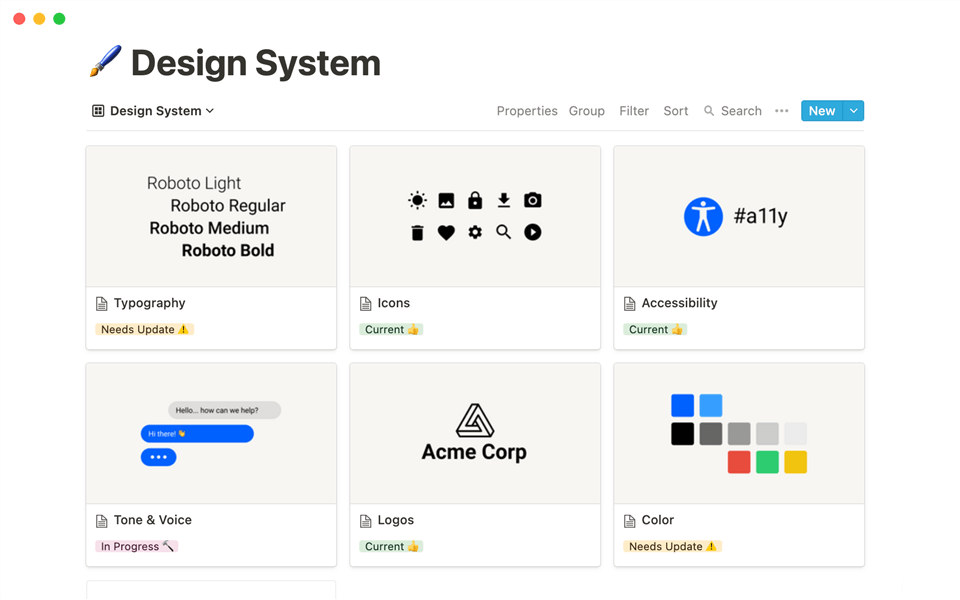
Apps for Organizing Research Notes – Notion
Notion’s Key Features
- It has a gallery view for images and a video player for previewing media files.
- Each cell in a table represents a separate editable page in Notion.
- It allows you to utilize the Markdown markup language for writing, standard shortcuts, and user interface components for formatting.
- You can roll up the text by converting it into a dropdown menu.
Supported Platform: Android, iOS, Windows, and Mac.
Customer Ratings:
- G2: 4.6/5 (1,084 Reviews)
- Capterra: 4.7/5 (1,217 Reviews)
Notion’s Price Plans: Free to $8 per month
2. Evernote
Evernote is a popular app that can be used on multiple devices for taking notes and saving web content that you find interesting. Evernote is a helpful app for students and scholars because it provides a centralized location for users to keep track of their goals, research notes, ideas, and tasks. Using labels and categories, you can store all these pieces in their proper places.
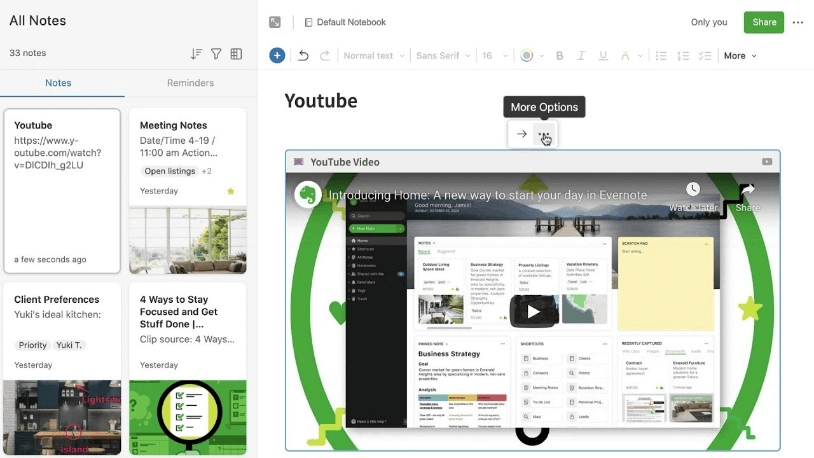
Apps for Organizing Research Notes – Evernote
Evernote’s Key Features
- You can select a specific area of the page for capture.
- Use it as a scanner when you need to copy pages from a book but don’t want to spend the money.
- A Google Drive symbol will appear alongside the text if you copy and paste a link to a Google Doc.
- You can sync your notes across all devices, giving you a unified note-taking experience.
Supported Platform: Android, iOS, Windows, and Mac.
Customer Ratings:
- G2:4.4/5 (1,975 Reviews)
- Capterra: 4.4/5 (7,728 Reviews)
Evernote’s Price Plans: Free to $8.99 per month
3. OneNote
Microsoft OneNote is amongst the most feature-rich and versatile paid note-taking software, and it is also the finest free option. For most individuals, this should be the go-to app right from the start unless you have particular needs that can’t be met. Because of its flexibility, OneNote may be customized to meet your note-taking requirements. Inspired by ring binders, Notebooks include parts, and inside those sections are smaller pieces called pages.
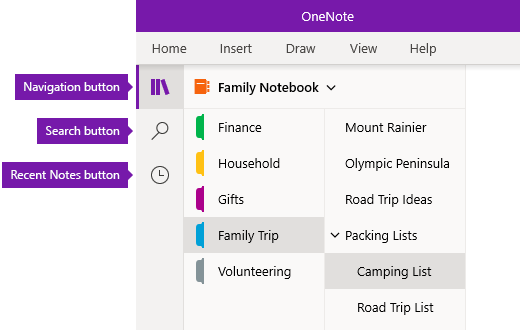
Apps for Organizing Research Notes – OneNote
OneNote’s Key Features
- Each page is a blank slate to jot down any message in any location.
- You can toss in some pictures and put in text remarks anywhere you choose.
- It’s a virtual journal where you may jot down notes and thoughts as they come to you.
- You can automate OneNote to avoid manually copying and pasting data.
Supported Platform: Android, iOS, Windows, and Mac.
Customer Ratings:
- G2: 4.5/5 (1,794 Reviews)
- Capterra: 4.6/5 (1,289 Reviews)
OneNote’s Price Plans: Free to $1.99 per month
4. Google Keep
Google Keep is a free, simple, cross-platform program for taking and organizing notes. Google Keep is a quick and colorful note-taking app on most Android handsets. Since Google Keep has built-in picture recognition, you can easily turn pictures of your notes or PDFs into text that can be easily searched. Maintain your files on your mobile devices and desktop. All the data you upload to Keep is synchronized across all your devices.
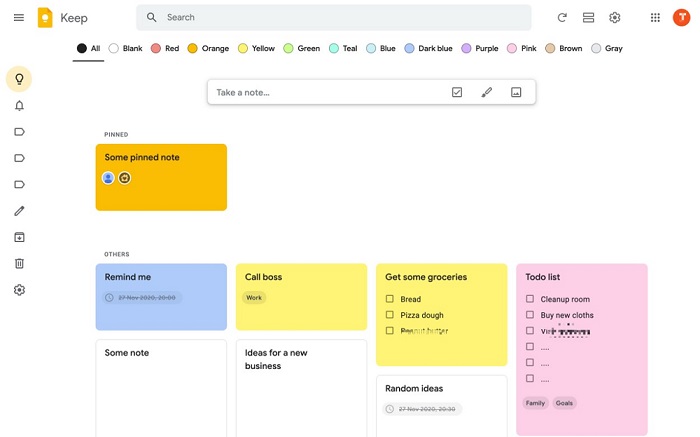
Apps for Organizing Research Notes – Google Keep
Google Keep’s Key Features
- You can set reminders for notes, which can be time or location-based.
- It allows you to share notes with others and collaborate on them in real time.
- It lets you search for notes using keywords and filter them by labels and colors.
- It integrates with other Google services like Google Docs, Calendar, and Gmail.
Supported Platform: Android, iOS, Windows, and Mac.
Customer Ratings:
- G2: N/A
- Capterra: 7/5 (122 Reviews)
Google Keep’s Price Plans: Free to use.
5. Roam Research
Roam is a one-of-a-kind note-taking software developed for academic purposes. People may use it to organize their data in index cards for later reference. Roam Research is distinct from similar programs because it takes a card-based rather than notebook-based approach to information organization. The nicest thing about using Roam to take notes on the fly is that your notes will be very localized and need a few taps to find and filter.
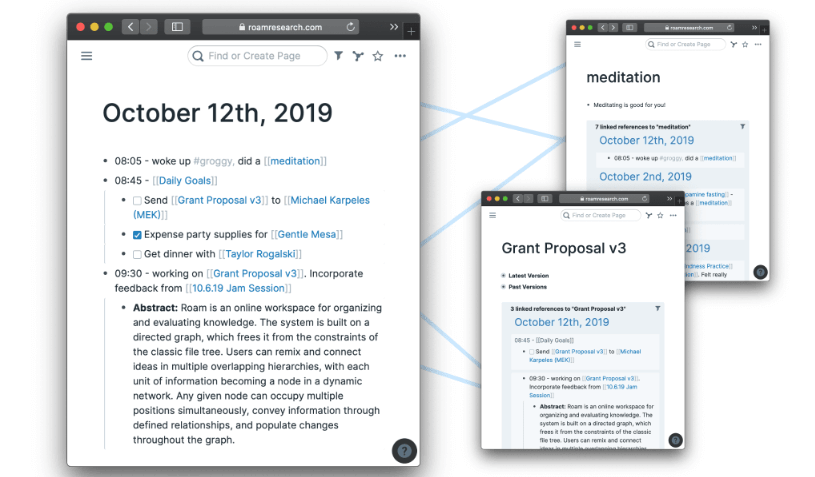
Apps for Organizing Research Notes – Roam Research
Roam Research’s Key Features
- It is available on the web and as a browser extension.
- You can create notes in text, images, code snippets, and embeds.
- It helps you organize notes using bi-directional linking, graph visualization, and tagging.
- It has a unique “Daily Pages” feature where users can create daily notes and link them to previous notes.
Supported Platform: Android, iOS, Windows, Mac, and Linux.
Customer Ratings:
- G2: N/A
- Capterra: 4.5/5 (13 Reviews)
Roam Research’s Price Plans: free to $15 per month
6. Milanote
Milanote is a design-friendly note-taking and organization tool that allows users to create, organize, and share notes visually appealingly. With features like boards, tags, and customizable templates, it’s perfect for creatives and design teams. You can access it through the web and as a browser extension, making it accessible from any device. Ideal for organizing research notes and providing feedback on designs and ideas.
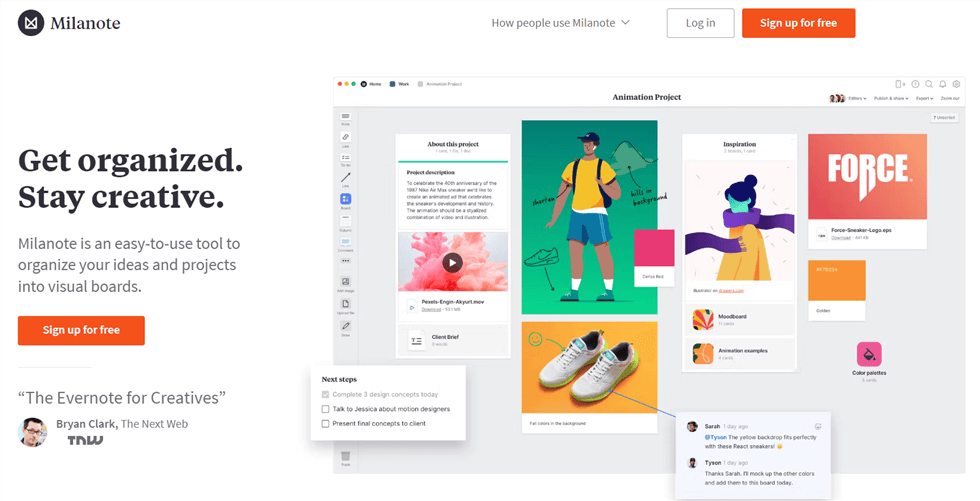
Apps for Organizing Research Notes – Milanote
Milanote’s Key Features
- It allows you to create templates and apply them to your notes, making it easy to maintain project consistency.
- Milanote integrates with other apps like Trello, Asana, and Google Drive.
- It offers advanced export options, such as exporting individual notes or entire boards as PDFs or images.
- You can add comments on notes, making it easy to provide feedback on designs and ideas.
Supported Platform: Android, iOS, Windows, and Mac.
Customer Ratings:
- G2: 4.5/5 (39 Reviews)
- Capterra: 4.7/5 (49 Reviews)
Milanote’s Price Plans: Free to $9.99 per month
7. Obsidian
Obsidian is a knowledge management tool that includes a delightfully flexible Markdown editor. You can create a one-of-a-kind knowledge graph by linking seemingly unrelated concepts in your notes. With plugins and personalized CSS, your Obsidian workspace may be tailored to your specific needs and workflow. Moreover, the tool is designed for people interested in using all these features and don’t mind doing some initial configuration.
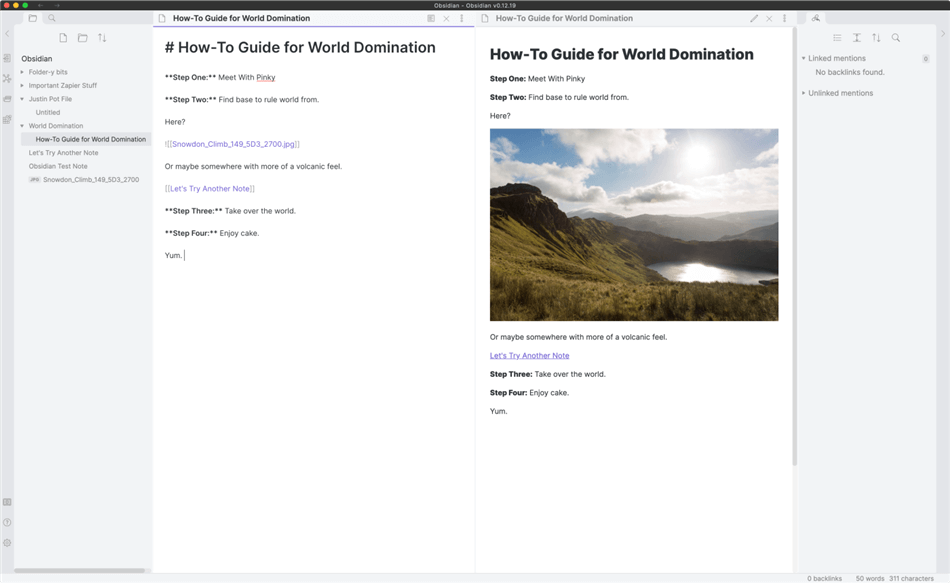
Apps for Organizing Research Notes – Obsidian
Obsidian’s Key Features
- It has a Markdown foundation and a basic (local) file and folder structure.
- Since everything in Obsidian is kept locally, you can use it even when you’re not connected to the internet.
- It allows you to make connections between different sites, so you may build on what you’ve already done.
- It provides a visual representation of the relationships between your notes.
Supported Platform: Android, iOS, Windows, Mac, and Linux.
Customer Ratings:
- G2: N/A
- Capterra: 4.6/5 (14 Reviews)
Obsidian’s Price Plans: Free to $25+ per month
8. Yahoo Notepad
The Yahoo Notepad is a web-based note-taking software created by Yahoo. It was made to help people keep track of their thoughts and ideas straightforwardly. When using Yahoo Notepad, users can scribble down ideas, arrange them in folders, and access their collected thoughts from any device connected to the web. It includes features such as the ability to insert hyperlinks, photos, and formatted text into notes that could be shared with others.
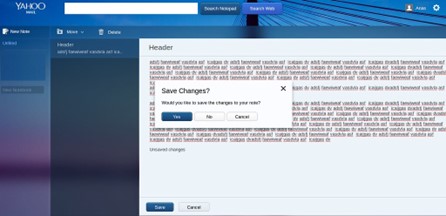
Apps for Organizing Research Notes – Yahoo Notepad
Yahoo Notepad’s Key Features
- You can share notes with others by providing them with a link to the note.
- It is accessible from any computer with an internet connection.
- It supports multiple languages, allowing you to create notes in their preferred language.
- You can format text and add links and images to your notes.
Supported Platform: Android, iOS, Windows, Mac.
Customer Ratings:
- G2: N/A
- Capterra: N/A
Yahoo Notepad’s Price Plans: Free to use.
9. Bit.ai
Bit.ai is a modern document collaboration and management platform that enables teams to create, collaborate and share documents in one place. It allows teams to create documents, wikis, and notes and collaborate with team members in real time. It also offers a range of features such as version control, document history, and access controls to help teams manage their content effectively.

Apps for Organizing Research Notes – Bit.ai
Bit.ai’s Key Features
- It integrates with other platforms like Google Drive, Trello, and Jira.
- You can receive notifications when changes are made to a document.
- You can set access controls for documents to control who can view, edit, or comment on a document.
- It uses bank-grade encryption to keep documents secure and private.
Supported Platform: Android, iOS, Windows, Mac.
Customer Ratings:
- G2: 4.2/5 (18 Reviews)
- Capterra: 4.5/5 (8 Reviews)
Bit.ai’s Price Plans: Free to $8 per month
10. Nifty
Nifty unifies your communications, tasks, documents, calendar, and meetings, so you don’t have to. Your team members and clientele may work together in one convenient app. Automating success tracking as work is done makes setting and sticking to objectives a snap. Using Kanban, List, and Swimlane views, you have a lot of leeway in setting priorities, handling tasks, and organizing your day.
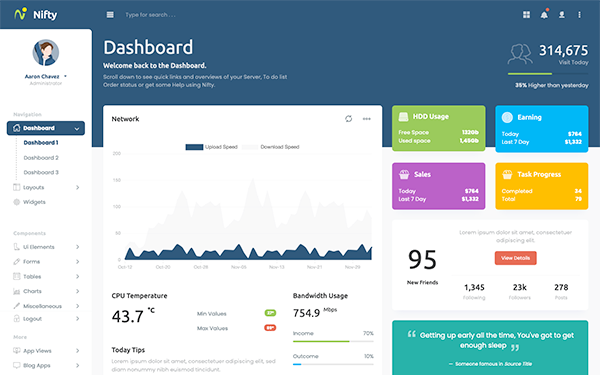
Apps for Organizing Research Notes – Nifty
Nifty’s Key Features
- Let team members collaborate on ideas, specs, and comments in real time.
- You can create documents and make notes and share them with anyone.
- It integrates seamlessly with Google Docs.
- Accessing automatic reports on the status of all your projects allows you to distribute your burden conveniently.
Supported Platform: Android, iOS, Windows, Mac.
Customer Ratings:
- G2: 4.7/5 (414 Reviews)
- Capterra: 4.7/5 (143 Reviews)
Nifty’s Price Plans: Free to $39 per month
Final Thought
To conclude, there are many apps to organize research notes effectively. Finding an app that works best for you and your specific needs is important. Some key elements to consider when organizing notes include source information, summary, relevance, quotations, and questions. And we hope you’ve found the best app to organize research notes after reading this article., Also, don’t forget to share your tips and tricks for organizing research notes, and leave a comment on how to organize research notes.



